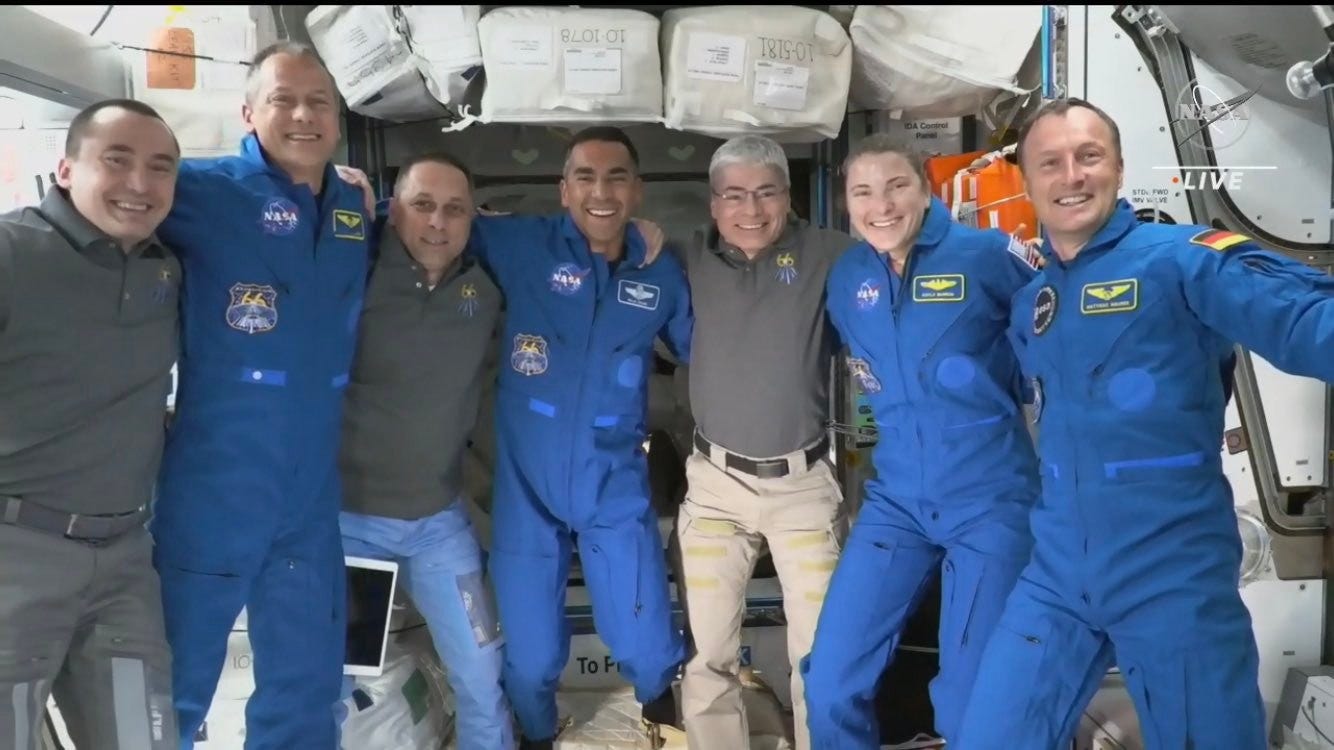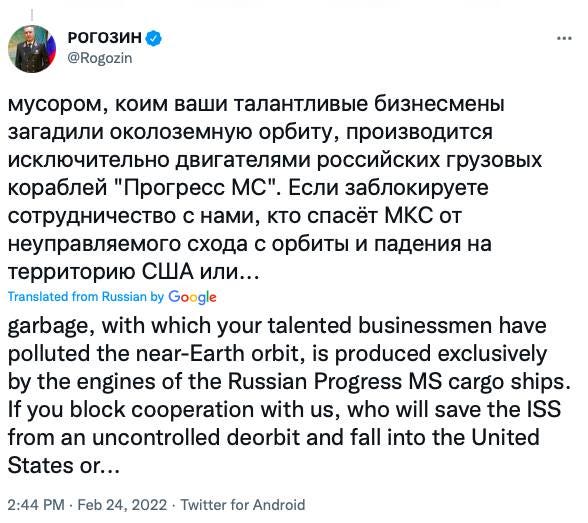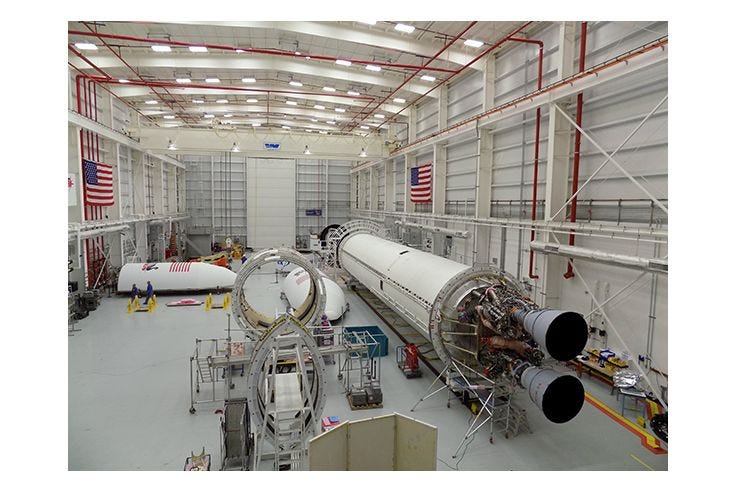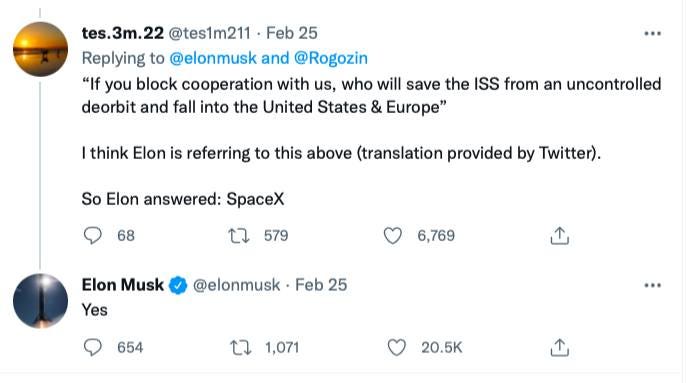
Thanks for finding Full Throttle. Please share and subscribe here. Full Throttle posts twice a week. Follow me on Twitter, Instagram, and Linkedin.
Russia and Vladimir Putin have been slammed with sanctions for the invasion of Ukraine. President Biden said the military action has led to a “complete rupture” of the US-Russian relationship.
There are seven Russians and Americans 250 miles up in space wondering what that means for the International Space Station (ISS), especially after the head of the Russian Space program launched a rant about sanctions (he referred to Biden’s actions as the “Alzheimer’s sanctions”). Dimitry Rogozin pointed out that they are Russian engines that boost the ISS to maintain its orbit and move it to avoid space debris. Rogozin, a politician close to Putin added, “Who will save the ISS from an uncontrolled deorbit and fall into the United States or Europe.”

NASA ADMNISTRATOR
Despite the rhetoric, NASA says all is well with the international space partnership. NASA Administrator Bill Nelson told the agency’s advisory panel Tuesday, “Despite the challenges here on Earth, and they are substantial, NASA is committed to the seven astronauts and cosmonauts on board, the International Space Station.”
NASA’s Kathy Lueders told reporters Monday, “we are not getting any indications, at a working level, that our counterparts are not committed to ongoing operation on the International Space Station.” In charge of NASA Space Operations, Lueders said both Russians and Americans continue to work together. “We as a team are operating just like we were operating three weeks ago,” she said.
NASA Associate Administrator for Human Spaceflight, Kathy Lueders, told reporters Russia and US are cooperating on operation of ISS despite the war in Ukraine. (Credit: NASA/Axiom)
PRODUCT OF THE END OF COLD WAR
The cooperation on the ISS grew out of the end of the Cold War and the dissolution of the Soviet Union. The American government thought the best course was to engage Russian scientists and keep them working on space, which led to the birth of the ISS. Lueders highlighted that history, saying the ISS, "was created as an international partnership with joint dependencies. Which is what makes it such an amazing program. It's a place where we live and operate in space in a peaceful manner.”
Despite the calming words, Lueders did admit there have been discussions to figure out other ways to boost the ISS. NASA wants to continue operation of the station until 2030 with commercial stations replacing the ISS. The Russian Roscosmos space agency is only signed-on through 2024.

Northrop Grumman Antares rocket under construction with Ukrainian built first stage on the right. (Credit: Northrop Grumman)
"OPERATIONAL FLEXIBILITY"
Lueders was diplomatic in discussions about alternatives to Russian participation. “We always look for how do we get more operational flexibility, and our cargo providers are looking at how do we add different capabilities?” she said.
One of those cargo providers is Northrup Grumman which flys the Cygnus spacecraft. “We'd had Northrop Grumman …offering up a reboost capability,” Lueders said, adding, “our SpaceX folks are looking at, can we have additional capability?”

Someone directly asked SpaceX CEO Elon Musk on Twitter whether his Dragon capsules could do the job. Musk was direct with a one word answer, “yes.”
STARLINK
Musk also answered a tweet from a Ukrainian Vice Minister asking for access to SpaceX’s Starlink system for internet connectivity. Musk sent ground receivers and said he is sending more. The Vice Minister tweeted a photo of the equipment arriving in Ukraine.

Northrop Grumman does rely on several Ukrainian companies for parts of its Antares rocket that is used for those Cygnus cargo flights to the ISS. Those Ukrainian companies build the core structure for the rocket’s first stage. One of those Antares took off less than a month ago.
Lueders, while admitting NASA is looking at “operational flexibility,” added that there is no plan to go it alone on the ISS. “It would be very difficult for us to be operating on our own,” she insisted.
"IT WOULD BE A SAD DAY"
While Dragon capsules have been carrying astronauts to the ISS, NASA does still use Russian Soyuz flights to transport crew members. Astronaut Mark Vande Hei, expected to set the American record for a consecutive stay (he should hit 355 days), is scheduled to return to earth on a Soyuz at the end of this month.
Lueders says it would be a "sad day" if NASA and Roscosmos stop cooperating on the ISS. (Credit: NASA/Axiom)
Despite the tweets from the Russian space chief, and news of the increasing sanctions, NASA hopes to stay above the fray. Lueders concluded, “It would be a sad day, it would be a sad day for international operations that we can't continue to peacefully operate in space. And as a team, we are doing that.”
(Cover photo credit: NASA)
I would love to hear from you. Please comment, and tell me what you would like to know about on Full Throttle.




